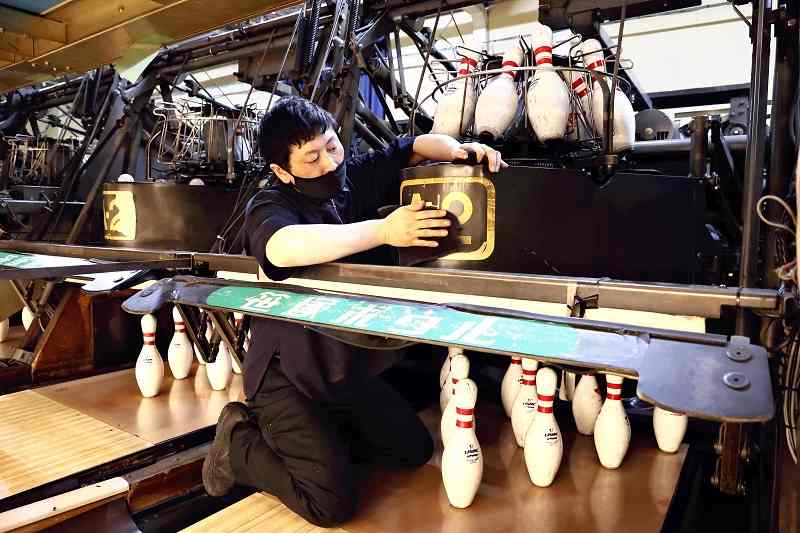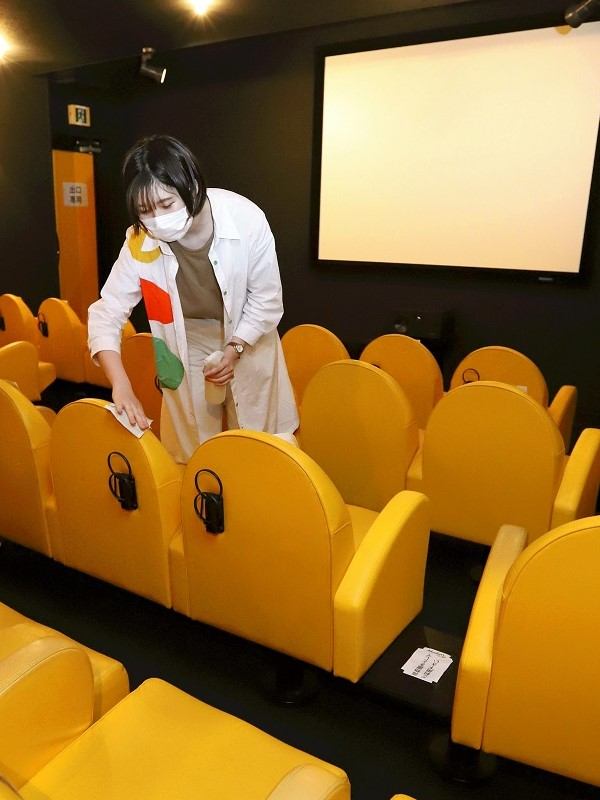
An employee prepares to reopen the Sasazuka Bowl bowling alley in Shibuya Ward, Tokyo, on Saturday.
17:24 JST, May 9, 2021
A sharp divide has emerged among cultural and sports facilities in Tokyo as restrictions on venue capacity will be eased from Wednesday under the extended state of emergency to cope with a resurgence of the novel coronavirus.
People scheduled to perform at theaters hurried to get ready, but some facilities that are still being asked to close have decided to shut down permanently.
Accountability sought

A staff member disinfects seats before a screening at the Shimokitazawa Tollywood movie theater in Setagaya Ward, Tokyo, on Saturday.
“Why are movie theaters being asked to close?” said Takahiro Otsuki, 54, president of the operator of the Shimokitazawa Tollywood theater in Setagaya Ward, Tokyo.
The Shimokitazawa Tollywood is a small movie theater with only one screen. It closed at the request of the Tokyo metropolitan government when a state of emergency was declared in April last year.
Movie theaters have again been asked to temporarily close under the current state of emergency declared last month, but sales at the Shimokitazawa Tollywood have plunged by 40% and the financially struggling operator has decided to continue operating the theater.
A new film was screened Saturday at the theater, with its normal seating capacity of 45 reduced by half.
“Everyone was watching the movie quietly. I think the risk of infection is lower than in crowded cafes and other places,” said a 25-year-old company employee of Tokyo’s Taito Ward who came to see the movie.
“The closures directly affect the income of people involved in film production,” Otsuki said. “I want more detailed explanations as to why theaters should close.”
Many movie theater operators are suffering amid the pandemic. Uplink Shibuya, a movie theater in Shibuya Ward, Tokyo, will close for good after the last screening on May 20.
The pandemic hit the theater hard at a time when its building and equipment are aging and need to be updated.
“We just barely survived last year, but we can’t see a future even if we make new investments,” said an official of the company operating Uplink Shibuya.
Calls from regular customers
Under the extended state of emergency, which was initially planned to end Tuesday, the central government will continue to ask eating establishments that serve alcohol to close, while allowing large commercial facilities to operate until 8 p.m.
However, the Tokyo metropolitan government will continue to ask for closures targeting a wide range of businesses such as department stores, movie theaters and bowling alleys, citing the need to control the flow of people.
Nevertheless, the Sasazuka Bowl bowling alley in Shibuya Ward decided Saturday to reopen for business from Wednesday. It has been closed since April 25 in compliance with the metropolitan government’s request, but many of its regular customers who are elderly have expressed such concerns as their lower bodies weakening because they cannot bowl.
The operator of Sasazuka Bowl decided it could not keep customers waiting any longer and decided to open the bowling alley from 10 a.m. to 6 p.m. for elderly people who visit there on a regular basis.
“I understand that the flow of people needs to be brought under control, but people can bowl without speaking loudly and with a mask on,” said Yoshihito Zaitsu, the executive managing director of the company operating Sasazuka Bowl. “We hope measures are specifically tailored to the type of business and the size of a facility.”
Hasty preparations
Currently, events are not allowed to have spectators in principle. However, under the extended state of emergency, events can have spectators and audience members as long as attendance is no more than 5,000 people or within 50% of venue capacity, whichever is less.
The metropolitan government will reopen its theaters, halls and outdoor sports facilities in the capital, including the Tokyo Metropolitan Theatre in Toshima Ward and Komazawa Olympic Park, which straddles Setagaya and Meguro wards.
The Akiko Kanda Dance Company, which is scheduled to perform at the Tokyo Metropolitan Theatre on May 15-16, on Saturday began preparations, such as printing flyers and ordering bento boxes. This year’s performance is intended to commemorate the 10th anniversary of the death of modern dancer Akiko Kanda.
“Last year’s performance was canceled, so we’ll be very happy if we can hold it this time,” said company representative Kumi Ichikawa.
The outdoor facilities of Komazawa Olympic Park are expected to reopen to the public. The park grounds were crowded Saturday with families taking a stroll and people jogging. Visitors were asked to wear masks over the public address system.
“I work mostly from home, so running is the best way for me to refresh mentally,” said Hiroyuki Morisaki, a 40-year-old company employee of Setagaya Ward who was running with a mask on. “More people may come here, but it’s a big park, so I’m not that worried.”
Top Articles in Society
-

Man Infected with Measles Reportedly Dined at Restaurant in Tokyo Station
-

Man Infected with Measles May Have Come in Contact with Many People in Tokyo, Went to Store, Restaurant Around When Symptoms Emerged
-

Woman with Measles Visited Hospital in Tokyo Multiple Times Before Being Diagnosed with Disease
-

Australian Woman Dies After Mishap on Ski Lift in Nagano Prefecture
-

Foreign Snowboarder in Serious Condition After Hanging in Midair from Chairlift in Nagano Prefecture
JN ACCESS RANKING
-

Japan PM Takaichi’s Cabinet Resigns en Masse
-

Japan Institute to Use Domestic Commercial Optical Lattice Clock to Set Japan Standard Time
-

Israeli Ambassador to Japan Speaks about Japan’s Role in the Reconstruction of Gaza
-

Man Infected with Measles Reportedly Dined at Restaurant in Tokyo Station
-

Videos Plagiarized, Reposted with False Subtitles Claiming ‘Ryukyu Belongs to China’; Anti-China False Information Also Posted in Japan























